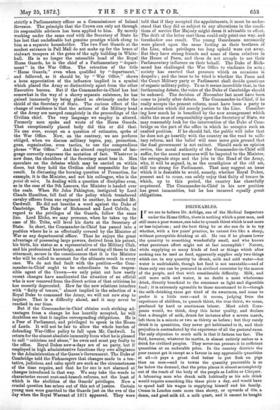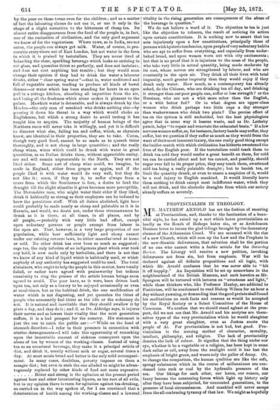DRINKABLES.
1 IF we are to believe Dr. Arlidge, one of the Medical Inspectors under the Home Office, there is nothing which a poor man, and still more a poor woman,can take to quench thirst which is not more or less injurious ; and the best thing he or she can do is to try whether, with a few years' practice, he cannot live like a sheep, without perceptible drinking at all. He can if he pleases lower the quantity to something wonderfully small, and who knows what persistent effort might not at last accomplish ? Nature, while supplying so many kinds of food or things which after cooking can be used as food, apparently supplies only two things which can in any quantity be drunk, milk and cold water—hot water is undrinkable, though hot food is not uneatable—and of these only one can be procured in civilised countries by the masses of the people, and that with considerable difficulty. Milk, and still more milk and water, is no doubt a most wholesome drink, directly beneficial to the consumer as light and digestible food ; it is extremely agreeable to those accustomed to it—though the milk-drinking races get tired of its sweetness, and come to prefer it a little sour—and it seems, judging from the experience of children, to quench thirst, the true thirst, we mean, produced by hard or continuous labour. Most adult Euro- peans would, we think, deny this latter quality, and declare that a draught of milk, drunk for instance after a severe march, left them in a minute or two as thirsty as before ; but they rarely drink it in quantities, they never get habituated to it, and their prejudice is contradicted by the experience of all the pastoral races. The only objection to much milk is that it fattens too fast. The fluid, however, whatever its merits, is almost entirely useless as a drink for civilized peoples. They never can procure it in sufficient quantities at an endurable price. In the country districts the poor cannot get it except as a favour in any appreciable quantities at all—it pays a great deal better to put flesh on pigs than on men—and in towns the quantity procurable is so
far below the demand, that the price places it almost as completely out of the reach of the body of the people as Lafitte or Clicquot.
A labouring man who drank milk habitually as his sole drink would require something like three pints a day, and would have to spend half his wages in supplying himself and his family.
Cream in London casts more than sherry, or upwards of 60s. a dozen, and good milk 4d. a milk quart, and it cannot be bought
by the poor on those terms even for the children ; and as a matter of fact the labouring classes do not use it, or use it only in the shape of a slight corrective to the bitterness of cheap tea. Its almost entire disappearance from the food of the people is, in fact, one of the curiosities of civilisation, and the only good argument we know of for the vegetarians. Where cows, as in India, are not eaten, the people can always get milk. Water, of coarse, is pro- curable everywhere out of East London, but not water in the form in which it is praised by teetotallers. They are never tired of belauiing the clear, sparkling beverage which looks so enticing in cut glass, and quenches thirst so perfectly, and does not inebriate, and does not cost anything but trouble ; but they would soon change their opinion if they had to drink the water a labourer drinks, either "clear spring water "—that is, water unfiltered and full of vegetable matter, tending to produce all kinds of bowel disease—or water which has been standing for hours in an open pail in a cottage kitchen, absorbing all impurities from the air, and losing all the freshness which alone makes it pleasant to the palate. Mawkish water is detestable, and is always drunk by the Hindoo —the only man of mankind who drinks nothing else—by pouring it down his throat in a way which would choke an Englishman, but which a strong desire to avoid tasting it has taught him to acquire. The majority of human beings of the Northern races will never take it willingly, and yet it is difficult to discover what else, failing tea and coffee, which, as chymists know, are identical in their properties, they are to take. Cocoa, though very good food, cannot be so made as to quench thirst thoroughly, and is not cheap in large quantities ; and the really cheap wines, wines which could be drunk with water in great quantities, as an Italian drinks them, without appreciable outlay, are and will remain unprocurable in the North. They are not liked either. Some sort of cheap wine could, we imagine, be made in England, either from grapes or apples, and if the people liked it with water would do very well, but they do not like it ; seem, if they try it, to suffer always from a crave from which the Southerner is free, a desire to load the draught till the slight stimulus it gives becomes more perceptible. The Devonshire men, who might water their cider if they liked, drink it habitually as strong as their employers can be induced to brew the pernicious stuff. With all duties abolished, light beer could probably be made nearly as cheap and palatable as it is in Bavaria, and would, we doubt not, under those circumstances be -drunk as it is there, at all times, in all places, and by all people, probably with very little bad effect, except upon sedentary persons or people exempt from labour in the open air. That, however, is a very large proportion of our population, while beer sufficiently light and cheap cannot under our existing revenue laws, be either manufactured at home or sold. No other drink has ever been so much as suggested ; sage tea, the only infusion of an indigenous plant which ever took any hold, is now made only by herbalists, and there is not that we know of any kind of liquid which is habitually used, or which anybody of any authority has suggested could be used. The total abstainers, who ought to help the people in this matter, have totally failed, or rather have agreed with praiseworthy but tedious unanimity to sing the praises of the article human beings seem agreed to avoid. The poor have, as it were, been driven back upon tea, not only as a luxury to be enjoyed occasionally or even at meal-times, but as the habitual drink, the one modification of water which is not disgusting, and yet quenches the thirst of people who necessarily feel thirst as the idle or the sedentary do not. It is natural and inevitable that they should swallow it by pints a day, and they do it ; and if, as Dr. Aldridge says, it injures their nerves and so lowers their vitality that the next generation suffers, it is a bad prospect for the country. His statement is just the one to catch the public ear :—" While on the head of stomach disorders—I refer to their presence in connection with uterine derangements—I will take this opportunity of remarking upon the lamentable amount of sickness consequent upon the abuse of tea by women of the working-classes. Instead of using tea as an occasional beverage, they make it a principal article of diet, and drink it, usually without milk or sugar, several times a day. At most meals bread and butter is the only solid accompaid- talent. In many cases, doubtless, poverty imposes on them a meagre diet ; but even in such the one alluded to might be advan- tageously replaced by other kinds of food not more expensive.
Bitter and strong is the agitation at the present period against beer and other intoxicating liquors, as the root of all evils, but in my opinion there is room for agitation against tea-drinking, as carried on in the way spoken of, for I am convinced that a deterioration of health among the working-classes and a lowered vitality in the rising generation are consequences of the abuse of the beverage in question."
We do not believe a word of it. The objection to tea is just like the objection to tobacco, the result of noticing its action upon certain constitutions. It is nothing new to assert that tea acts injuriously upon a few constitutions, principally those of persons with hysteric tendencies, upon people of very sedentary habits who are apt to suffer from everything, and especially from under- baked bread, and upon women worn out with city excitements ; but that is no proof that it is injurious to the mass of the people, who take very little in actual quantity, being made moderate by its cost, whose nerves are strengthened by labour, and who are constantly in the open air. They drink all their lives with total impunity, much greater impunity than they would enjoy if they drank only water. How much, as a contemporary has already asked, do the Chinese, who are drinking tea all day, and drinking it stronger than our poor people can, suffer or lose strength? or the Russians, who are not a whit more sober • than the English, or a whit better fed? Or in what degree are upper-class women who drink perhaps two little cups a day stronger than washerwomen who drink two pints? The precise effect of tea on the system is still undecided, but the best physiologists agree that in some way it lessens waste, and as Dr. Letheby puts it, helps "to repair and renovate the exhausted brain." If afew nervous women suffer, as, for instance, factory hands may suffer, they suffer, but we question if they suffer as much as they would from the want of their most innocent luxury, the one really good thing except the lucifer-match with which civilization has hitherto sweetened the lives of the English poor. If the teetotallers could teach them to drink tea cold they would confer a great benefit on them, for cold tea can be carried about and hot tea cannot, and possibly, should sugar ever fall to its proper price, they may teach them, sweetened cold tea being a really palatable draught ; but to banish tea, or limit the quantity drunk, or even to create a suspicion of it, would be a real injury to English mankind. It would literally leave them nothing to drink except most indifferent water, which they will not drink, and the alcoholic draughts from which our society already suffers so severely.



































 Previous page
Previous page